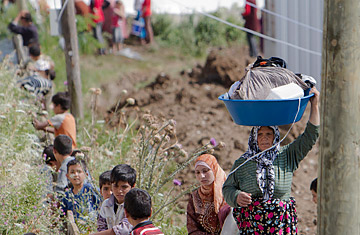
A Syrian refugee brings laundry to an irrigation canal, located in a camp in Boynuyogun, Turkey, on June 14, 2011
(2 of 2)
On Sunday around 9 p.m., the crowd on the Syrian side of the opening showed no sign of thinning. Entire extended families waited in near total darkness to pass to safety. The nervous refugees worried about the conditions on the other side.
"Is it true that if we go to a camp, we can't return?" somebody asked.
"You'll be in a tent," someone responded. "You'll have food."
"I returned after 20 days. They are treating us very well," a male voice added.
Em Mohammad, a woman in a black abaya and firmly fixed hijab, sat on a rock near the opening with her adult daughter Em Mahmoud; her three grandsons, ages 11, 5 and 2; and their father Abu Mahmoud. "It's like in the '80s: they are burning our houses, showering us with bullets," she said, referring to an offensive against Jisr al-Shughour by Assad's predecessor and late father, Hafez. "We came one week ago. I haven't showered in a week." After a while, she started crying, and said to her son-in-law, "How can I go to Turkey and I don't know where my sons are?" She turned to me. "They said they would follow us, but we haven't heard from them. The telephone lines are cut. I swear to God, Israel wasn't this bad to us!"
"What do you think?" Em Mahmoud asked me. "Is it better for us over there?"
"At least the children will have milk," her husband said, carrying his two youngest sons.
The next morning, on Monday, the distant wail of an ambulance from over the Syrian hills could be heard. An old man shot in the abdomen and a hand walked to the opening with difficulty and was ferried through by the Turks. News quickly spread through the camp: It's Ahmad Sadik, he's been shot. Jisr al-Shughour is now a ghost town, its residents say, although a few people have stayed behind, refusing to leave their hometown.
The refugees are all from Jisr al-Shughour and its surroundings, villages where people know one another and are often related, and where strangers stand out. There are a handful of clear leaders among the refugees who are on the lookout for infiltrators and regime loyalists. There are also several activists who upload videos (via mobile Turkish Internet devices) on two laptops they keep charged using a small generator. They sit on plastic chairs and in the dirt, talking about revolution and what will come next.
"What is the West's fear? Why aren't they helping us?" asked Mohammad Nader Zatar, 40, who insisted on giving his real name. He was shot in the arm a week ago, sneaked into Turkey for treatment, and was back in the fields. "Islamists? Are they afraid we'll be ruled by Islamists? Turkey is run by Islamists." (Prime Minister Recep Tayyip Erdogan's ruling Justice and Development Party has Islamist roots.)
"I don't have a problem with another Alawi President," said Fadi, 31, referring to Assad's minority sect, which represents about 12% of Syria's largely Sunni population.
"Regardless of what politicians overseas fear, they must know that we want democracy," said Mohammad, 26, who was uploading a video of testimony from a refugee. "Nothing fuels religious extremism more than poverty and oppression. They know that, don't they?"
"Abu Jaafar," another activist, was keen to stress that he respects Syrian soldiers, but not the officer corps: "It's the people's army. They are us, and we are them." Zatar, who had been listening keenly, agreed but said he had a message for "the regime and its traitors" and collaborators. "We will try you," he said. "Bashar Assad will escape to Iran, but where will you hide?"
